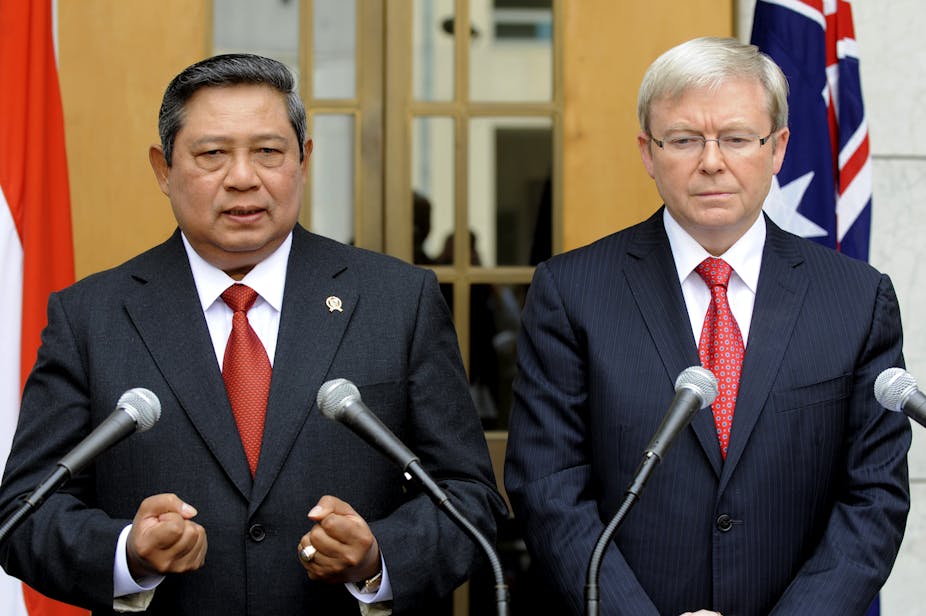New prime minister Kevin Rudd will visit Indonesia later this week for the third Indonesia-Australia Leaders’ Meeting. Rudd will seek to exchange military - and possibly developmental - aid for Indonesian president Susilo Bambang Yudhoyono’s assistance on curbing the increasing flow of asylum seeker boats.
Australia needs to work with Indonesia on the issues involving both parties, including asylum seekers. But the key word is “with”. Does Australia see Indonesia as an equal partner at the negotiating table?
Lately it seems that when Australia needs to agree on something with Indonesia, there is every chance it will make a mess of it. Scholars have previously written about Australian perceptions of Indonesia as a place of “difference”. Emphasising these differences gives Australia a greater sense of our own constructed national identity.
Discussion of Indonesia is framed in Australia’s Western perceptions of “the Orient”: that is, through continual negative stereotyping, as a place of misgovernment and arbitrary rule of law. This is then used to justify Australia’s “intervention”.
Look around and you’ll see this argument pop up regularly with regard to Australian policy towards Indonesia. One example is the argument that Australia should intervene and push for leniency for Schapelle Corby by creating a prisoner exchange. It is also evident in Labor’s intervention in live cattle exports, without trying to work with Indonesia over the issue.
In the case of asylum seekers, the opposition wants “intervention” by greater Australian Federal Police presence on the Indonesian coastline, or by the Australian navy towing back boats. Indonesia is told to simply “cooperate” with such plans.
Australia remains preoccupied with preconceptions of how Indonesia should deal with asylum seekers. The solutions are seen through Western eyes, rather than asking Indonesians how they feel issues should be addressed.
The main problem is clear: Australia has very little understanding of the issues which affect our nearest northern neighbours. A 2013 Lowy Institute poll found that only one in three of those surveyed agreed that Indonesia “is a democracy”. The paper argued that this was at least one example which “underlined the poor knowledge in Australia about Indonesia”.
Numerous Lowy Institute polls have shown for many years that Australians are distrusting of Indonesia. For example, a 2006 poll placed Indonesia fourth behind only the so-called “axis of evil” – North Korea, Iran and Iraq – as the country Australians felt was the greatest threat to their national security.
Each year, 17,000 Indonesian university students come to study in Australia, with only 150 Australian university students heading in the opposite direction. This is clearly not a discussion on equal terms. Indonesians are learning a lot from Australia, and Australians are doing next to nothing to learn about Indonesia.
At the heart of the problem is arguably the lack or decline of Indonesian language and studies prevalent in our education system. The study of Indonesian language in Australia is not in decline: it’s going into cardiac arrest. For example, in 1996 there were 44,973 NSW public school students studying Indonesian. In 2011 there were only 6,029. Of those 6,029, only 87 were studying Indonesian in year 12.
A report completed last year by Murdoch University’s David Hill, Indonesian in Australian Universities, shows Indonesian language learning in Australian education is in crisis. Six universities closed their Indonesian programs between 2004 and 2009.
There are signs the lack of Indonesian knowledge within the education system is being addressed. Labor’s AsiaBound programs are under way. The Coalition’s “reverse Colombo Plan”, where more Australian students will be sent to Asian universities, is being conceived. If done well, these initiatives will hopefully see Australian participants gain greater respect for Indonesia.
But these initiatives need substance and time to create demand, perhaps 10 to 15 years. This is a factor often forgotten by those who prefer a quick fix or sound-bite solution for the TV cameras at the next bilateral meeting.
As both parties gear up for funding cuts on universities – the main institutions which support these new initiatives – it is often small enrolment programs that are first to be closed down. When the numbers for Indonesian language are so low in schools, it is little wonder the demand is not there at university level.
When Indonesia looks at Australian policy toward it, what will it find? An opposition whose most vocal policy is to call asylum seekers “illegal” and demand they be forcibly turned back to Indonesia, effectively saying “we will intervene to make sure you deal with this issue in a way that suits us.”
Indonesia will also see an Australian government with a new leader after another spill, trying to coax Indonesia to agree with its view that the Coalition is risking future conflict between the two nations.
It is little wonder Indonesia has not wanted to get drawn into the mudslinging currently pervading domestic Australian politics. They have a lot in common with many Australians in that regard. Perhaps we aren’t that different after all.

